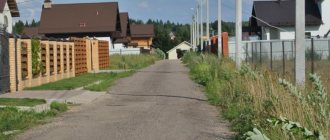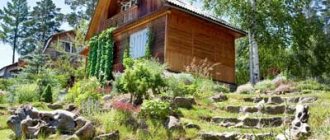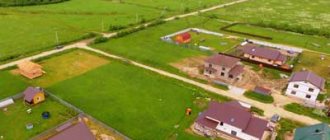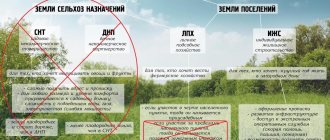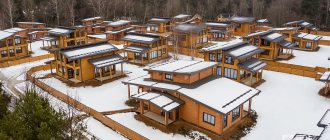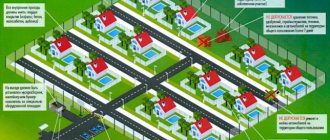For many people, owning a summer cottage or gardening is a hobby, and often a significant help in everyday life. Vegetables, fruits and berries grown with one's own hands are used for procurement, and for many people this is a significant contribution to the food system and a way to save on food.
At the same time, incomprehensible abbreviations, such as DNP, SKHN, IZHS, cause difficulties for many. SNT is a form of organizing the activities of gardeners. The wording is quite general, and many questions require answers: why should these citizens unite, how do they differ from ordinary summer residents, how is their activity regulated within the legal framework? First of all, let’s decipher: SNT is a gardening non-profit partnership. Its creation always pursues a single goal - to resolve common issues that arise not just for one, but for all united citizens. The usual decoding of SNT does not provide direct explanations about the specifics of its activities. Let's take a closer look at this concept.
Concept and interpretation of the abbreviation SNT
The decoding of SNT sounds like this: Horticultural non-profit partnership. This is a legal entity that helps resolve problematic situations of summer residents in relation to land holdings.
Other associations of owners, individual housing construction and ONT, stand for individual housing construction and gardening non-profit partnership. Individual housing construction lands are used for housing construction. You cannot build houses in a gardening association.
Law No. 217 of July 27, 2021 abolished Dacha Non-Profit Partnerships (DNP). The dachas were not liquidated; they were classified as SNT.
Terminology
In the field of suburban real estate, with the help of dacha non-profit partnerships, new prospects are opening up. Citizens who want to purchase a country house are becoming increasingly interested in such a union.
As for the definition, it boils down to this formulation: a form of community of people created for the comfortable use of the sector intended for agriculture.
Associations themselves are created on two types of sites:
- In an existing settlement.
- In an area where agricultural land is grown.
The main goal of the union is to provide legal and everyday assistance to its members.
The most important verdicts are agreed upon by all participants. This protects against negative consequences.
Pros and cons of a garden partnership
Garden associations have common pros and cons compared to other forms of land management.
Pros:
- low price relative to individual housing construction;
- The area of the plot is not important when building a house;
- fees are lower, since the tax rate is 0.3% (for individual housing construction - 1.5%);
- location (ecologically clean places, near forests and reservoirs);
- fertile lands with a high quality score.
Cons of SNT:
- Cash fees. Gardeners invest their own funds to develop the partnership, improve the territory and pay salaries to the managers of the association.
- It's difficult to register. The address is assigned through the court.
- No communications. Gardeners install gas, water supply and electricity at their own expense.
- They are located far from the regional center with infrastructure.
- It's difficult to get a home loan. Banks have difficulty issuing loans at reduced interest rates for garden lands.
- Tax deductions take longer to process.
IMPORTANT! From March 1, 2021, the owner of the site must coordinate the house construction project with the local administration. The authorities issue a permit for 10 years.
What is possible and not possible on SNT land
Plots in a garden partnership can be sold or bought, donated and passed on by inheritance. There are restrictions and relaxations for owners.
Can:
- build a house;
- erect outbuildings;
- plant a garden with crops;
- change the status of the site.
It is forbidden:
- engage in subsidiary farming and entrepreneurship;
- conduct communications without the consent of the other members of the partnership;
- disobey the rules adopted at partnership meetings.
ATTENTION! The dacha amnesty in Russia is being extended until March 1, 2026. This means that owners of garden plots have the opportunity to register their lands and buildings according to a simplified scheme.
Important points
When purchasing or building a dacha in DNP, you should take into account the following nuances:
- Neighbours. This is especially important because you will have to contact them in any case.
- Availability of transport. To avoid walking several kilometers to travel to the city.
- Infrastructure. First, gas, water and electricity are laid, and then the road. Sometimes there may be a difference in this order.
- Reputation as a land seller. We need to find out the reason why he is selling the plot.
- Fence. To keep the property safe.
- The soil. It should not be clayey or swampy. Otherwise, how to do gardening and gardening?
It is not recommended to purchase a plot in winter. At this time, it is impossible to understand what kind of land is under the snow. Such moments must be taken into account so that you can relax peacefully at the dacha.
Differences between SNT lands and other associations
Individual housing construction lands are located on the territory of populated areas with infrastructure, and therefore are valued higher in the real estate market. They are purchased for housing construction. In accordance with Article No. 284 of the Civil Code of the Russian Federation, the owner must begin construction of the house within 3 years, otherwise the site may be seized. It is not necessary to build a house on garden land.
In some cases, local authorities allow changing the purpose of SNT land to individual housing construction. To do this you need:
- Submit an application to the municipality with a justified request to classify the plot as individual housing construction land. Legal and identification documents must be attached to the application.
- Wait for the decision of the authorities and obtain the corresponding act.
- Register changes in Rosreestr if a positive response is received.
ADVICE! The owner can go to court and appeal the act if administration officials refuse to change the status.
SNT differs from gardening partnerships in its high cadastral value and market price (by 15–20%). And also by location: natural areas are allocated for gardening associations, and remaining agricultural areas are allocated for ONT.
Lamb's blog
Very often, my clients ask me questions regarding the legal background of land plots and houses that are located within some DNT, SNT or SOT, as well as the advisability of investing money in their purchase. Therefore, I decided that you can find out the answers to the most frequently asked questions regarding such real estate in this article.
1. What are DNT, SNT and others?
These are non-profit organizations established by citizens on a voluntary basis to assist its members in solving general social and economic problems of gardening, vegetable farming and summer cottage farming. Most often they are found in the form of partnerships, for example, DNT is a dacha non-profit partnership, SNT is a garden non-profit partnership. Their activities are regulated by the Federal Law “On horticultural, gardening and dacha non-profit associations of citizens.”
2. Is it possible to build a house for permanent residence in DNT, SNT and other non-profit partnerships, as well as on agricultural lands for gardening?
First of all, you should first pay attention to the permitted type of use of the land . You can find out by studying the certificate of state registration of ownership of the land plot, as well as by comparing its data with the data specified in the cadastral passport for the land plot.
In order to be able to build a house for permanent residence (and also obtain title documents for it), it is required that the permitted type of use be for gardening, for horticulture and gardening, for summer cottage construction. If the permitted type of use is specified as only for gardening, then it will be impossible to register ownership of a house located on such a plot of land. That is, if the documents for a land plot indicate that the land plot can be used for gardening or for summer cottage construction, then on this land plot it is possible to build a house for permanent, so to speak, year-round living.
Also, regardless of what category of land your land plot belongs to, whether it is “land of settlements” or “land for agricultural purposes”, this is not an obstacle to building a house if the permitted type of use of the land plot allows it. Thus, if the certificate indicates that the site is classified as “agricultural land - for gardening,” then there are no obstacles.
By the way, it is necessary to check the data from the certificate of state registration of ownership of the land plot with the data from the cadastral extract for the land plot. Quite often the data differs, which means additional problems for the future owner.
3. Is it possible to register in a residential building built on a plot for gardening?
Until 2008, this was impossible in accordance with the Federal Law “On gardening, gardening and dacha non-profit associations of citizens.” But thanks to two appeals from several residents of the Krasnodar Territory to the Constitutional Court of the Russian Federation, these provisions were declared unconstitutional and lost force. Thus, since 2008, the Federal Migration Service has been registering at the place of residence in “garden” houses built on land plots classified as “land of settlements”, and since 2011 in “garden” houses on land plots classified as “agricultural land”. The main thing is that the ownership of the house should indicate that it is “House, purpose: residential” or “Building, purpose: residential house.” All you need is a completed house register (it is usually certified directly by the Federal Migration Service), a certificate of ownership of the house, the owner, passports and personal presence.
4. The certificate of ownership of the house indicates that it was obtained on the basis of the “Declaration of the Property”. What does it mean? What should you pay attention to?
This means that the title document (certificate of ownership) for the house was received under the so-called “dacha amnesty”. This is a simplified procedure for obtaining documents for a home, which is still in effect at the time of writing this article.
To avoid problems in the future, the certificate of ownership must state that this is “House, purpose: residential.” Also, the total area and layout of the house must correspond to the total area indicated in the technical passport for this residential building. This at least guarantees you the possibility of registering in the house, as well as the absence of unnecessary questions when installing communications, for example, gas, into the house.
5. If there is a difference between the following concepts “House, purpose: residential”, “Building, purpose: residential building” and “House, purpose: residential building”?
From the point of view of the possibility of registration (registration) in such a house on a garden plot, there is no difference. I personally saw different options; in most cases, records like “Building, purpose: residential building” and “House, purpose: residential building” indicate that the house has already been registered in the cadastral register (not a fact, but still). But such a statement is not yet necessary, unless, of course, you are selling or buying a house with a mortgage.
6. Is it possible to connect a house built in DNT (SNT) to central communications?
There are no obstacles other than monetary ones, if communications are nearby and there is a technical possibility. You can determine which communications run next to your land plot visually, as well as according to a recent topographic survey registered in the department of architecture of the city or district.
7. What additional expenses do homeowners in DNT, SNT, SOT and other partnerships have?
You need to check with the board of the cooperative before purchasing. All expenses incurred by the previous owner are usually recorded in the membership book, and some conclusions can already be drawn from them. Each situation for each partnership must be analyzed individually.
If this post helped you, share it with your friends. This will be the best support for me!
Or throw the author a beer
- Articles on this topic...
- Taxes on the sale of real estate in 2021 - January 13, 2016
In order to leave a comment, you can log in through any social network below:
Governing bodies in SNT
To create a partnership, three people are enough who are ready to unite and register in the Unified State Register of Legal Entities.
At a meeting of members of the association, the owners elect a chairman, the Board of Management and the Audit Commission. Between meetings, organizational and economic issues are decided by the Board, which distributes the collected funds and reports for them to the partners.
Managers are re-elected every two years by closed ballot. Elections are held earlier if half of the owners insist on a change in management.
The SNT charter is drawn up at a general meeting. This is the main document that regulates the actions of the partnership. The typical form includes:
- board structure and number of people;
- time and procedure for electing leadership;
- rights and obligations of partners;
- objectives of the partnership;
- inner order rules.
Each meeting is recorded in minutes, which are signed by the chairman and stamped. Protocols are stored and taken into account during verification. The meeting is considered to have taken place if the majority of the members of the partnership were present.
Another necessary document is the job description for the chairman and the Management Board.
The role of the Board is to implement the resolutions of the Meeting. The chairman acts on behalf of the partnership, represents interests in court and local authorities, if a written power of attorney has been received.

